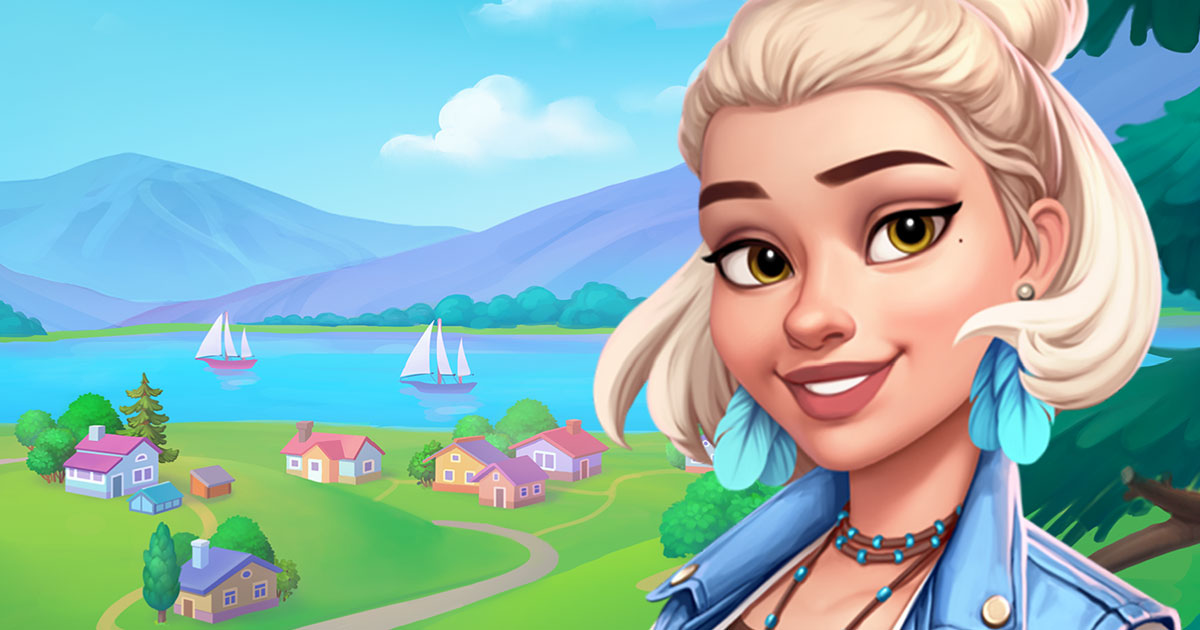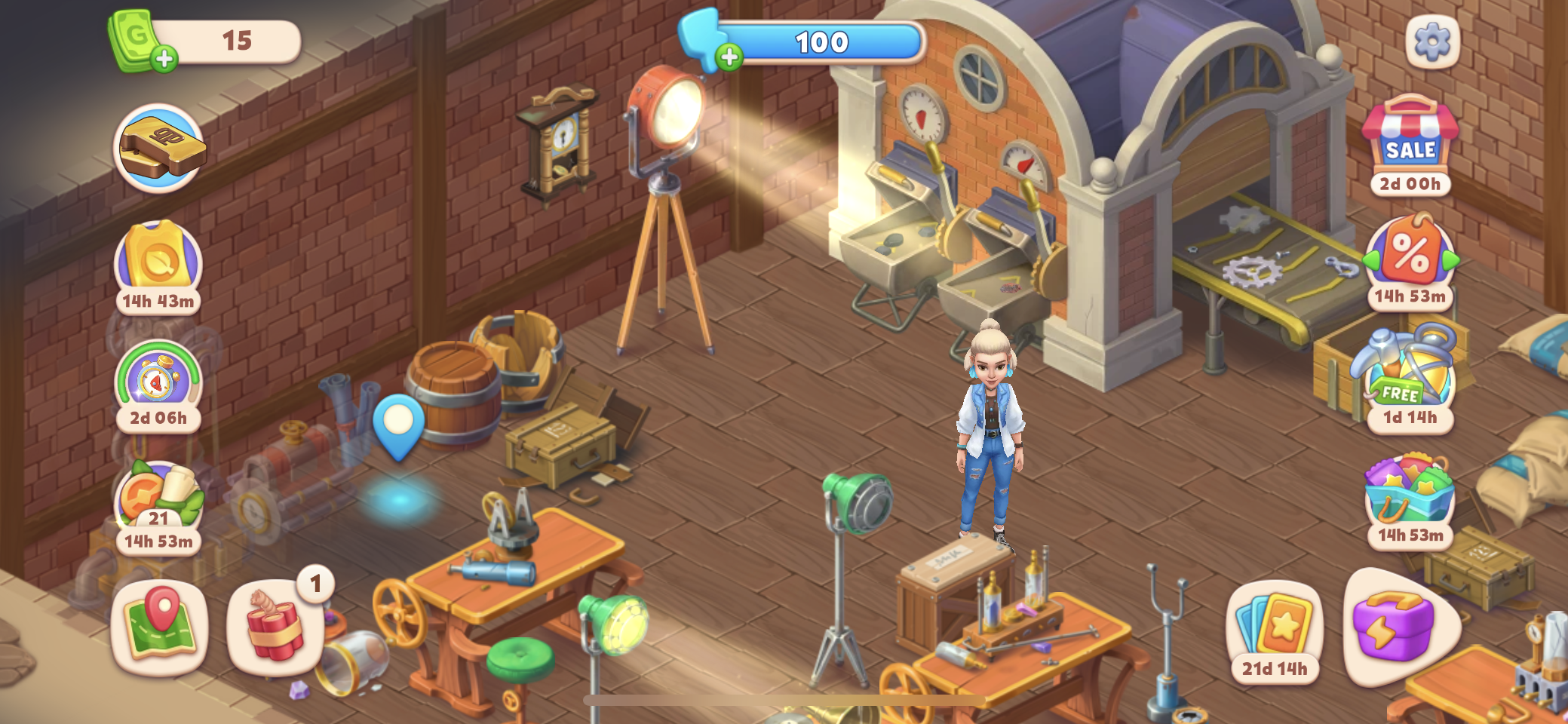We continue our series of publications where experts from game companies talk about their professions. The new article in the series is about game designers. Two game designers from Glera Games — Natalia Sholina and Igor Petrov — shared detailed insights about the profession.
Who is a Game Designer?
Natalia Sholina
A game designer is a specialist who engages in the development of a game in all its various aspects. Such aspects can include:
- concept;
- game content;
- game mechanics;
- plot;
- characters;
- levels;
- balance
- …and much more!
Summarizing all these aspects, it can be said that a game designer is responsible for making the game interesting, engaging, and meeting the players' expectations.
The profession of a game designer is a creative and multifaceted field that combines art, design, and technical skills to create a single captivating interactive product.
A game designer needs to have systematic thinking, an understanding of game mechanics and balance, knowledge of the market, and an understanding of player psychology. Additionally, they must adapt the gameplay to different audiences. It is also crucial to have team-working skills since the game development process usually includes collaboration with other team members, such as narrative designers, artists, animators, programmers, and sound engineers.
Every game development experience is unique, as is every game world. Among the game designers I have met, there were directors, economists, veterinarians, lawyers, teachers, and even a nuclear physicist.
Any experience can unexpectedly become useful. For example, I have a musical and philological background, which sometimes comes in handy when selecting references for musical tracks or writing documentation.
Igor Petrov
A game designer is a specialist responsible for developing game concepts and mechanics — from scratch to operation. To simplify, they define the rules and tasks for players according to the game's vision and the goals set for the game designer. The main aim is to ensure that each part of the game is as interesting and engaging as possible.
What Are the Responsibilities of a Game Designer, and What Should They Do?
Natalia Sholina
The responsibilities of a game designer can vary depending on the size of the team, the game's development stage, its genre, and the specialist's area of focus. Here are some general tasks:
- Developing the concept: The game designer develops the overall concept of the game/event/mechanic, determining its features, theme, plot, and goals, and presents the concept to producers and the team.
- Developing game mechanics: This task involves working on the game mechanics — rules, interaction, and control systems that determine how players engage with the game.
- Levels and game world structure: The game designer creates the game's levels or the game world's structure, defining the player's progression and content distribution.
- Characters and their behavior: They develop the game's characters, their attributes, unique abilities, and behavior.
- Game balancing and tuning: The game designer is responsible for balancing the game and tuning configurations to ensure a fair and engaging gameplay experience and a positive experience for players.
- Understanding key analytical metrics: It is essential to set expectations for a new game/mechanic/feature and, after its release, analyze whether it meets those expectations and what changes may be needed to improve results.
- Testing, feedback collection, and iterations: They participate in game testing, analyze feedback, and make improvements to enhance gameplay.
- Writing GDD (Game Design Documentation): The game designer creates technical documentation describing game mechanics, levels, characters, and other aspects of the game for the development team.
- Working with the development team: They work closely with artists, programmers, sound engineers, and other specialists who contribute to bringing the game concept to life.
It is very challenging to provide an exhaustive list of a game designer's duties since, in reality, they can be diverse and dependent on the project's requirements. Each game and every aspect of a game is unique, with many features that can only be learned and mastered by getting involved in the project. For example, you may join a new team and find out on the first day that you will now be directly interacting with code and configurations, even if you have never done so before. Usually, a great team helps you, and new experiences always broaden your horizons.
Igor Petrov
The primary responsibility is to develop game mechanics (from creating concept documents to operating the final feature). At every stage, the game designer must constantly collaborate with all other departments involved in the feature's development. A game designer typically has extensive but shallow knowledge in various areas of game development — game balance, level design, etc.
What Does a Game Designer Need to Know to Perform Well?
Natalia Sholina
An excellent answer would be "the more, the better!" It is crucial never to stand still, stay curious, develop, keep up with the continuously evolving market, watch competitors, and bring all the great ideas that can diversify or change the approach, making the product even better.
A brief summary of skills can be outlined as:
- Understanding game mechanics and genres, and having a good overview of the competitive market in its diversity and constant dynamics.
- Creativity and imagination, as well as the ability to formulate and present your ideas to the team.
- Systemic thinking and analytical skills: it's important to be able to analyze the gaming experience, identify the strengths and weaknesses of the game, and understand the needs and preferences of the audience.
- Soft skills: a game designer cannot work without interacting with other team members, so teamwork and communication skills are crucial. Ideally, creating a creative and inspiring atmosphere where every participant understands their tasks, receives good feedback, and enjoys the results of collective efforts is essential.
- Basic technical knowledge. While I haven't met any game designers who are also programmers, understanding the technical aspects of game development, such as game engines, programming languages, etc., can be very useful. When setting tasks, we often have to "translate" from the language of ideas and concepts to a technical one to clearly describe our expectations to specialists regarding how a particular aspect of the game should be implemented.
- Understanding balance: depending on the project, a game designer might be directly involved in calculating balance. Even if a separate specialist is handling this, it's important to have a grasp of how to balance the game to provide an engaging experience.
- The ability to listen and accept feedback: being open to feedback and ready to make changes in the game is important. It's also crucial to avoid taking feedback too personally, as a strong attachment to the concept and its realization can develop during the work process.
- Knowledge of the target audience and player psychology: understanding player motivations and preferences helps in determining what can "hook" the player.
- The desire and drive to develop and enhance the product: the gaming market is dynamic and competitors are always active! Being interested in surrounding events and wanting to improve your game is important.
However, like in all other aspects, every experience and project is unique, so needs can vary significantly. Becoming a universal specialist is challenging, but it's important to listen to your heart and choose the direction that inspires you the most. Fortunately, there are many options! And everyone loves to play.
Igor Petrov
A good game designer should know their stuff—foundations of game design, player psychology, be creative and technically savvy. They should understand graphic design and have strong analytical abilities. I also believe that having critical thinking and strong teamwork and communication skills is important.
What does a game designer's typical workday look like?
Natalia Sholina
Days can vary a lot, but many of them consist largely of meetings.
I've been working remotely for about 7 years, so all my meetings are via videoconference, which doesn't affect the quality of communication with the team. Most people are used to seeing colleagues online and communicating in work chats and tasks. Meetings are needed to present and discuss concepts, synchronize visions, and talk about expectations and the results of changes we make in the game. More often than not, it's more effective to discuss any work-related issue by voice than by writing, so a game designer's job involves a lot of calls and heated discussions.
Besides meetings, time is required for preparing documentation, configuring the game, setting tasks, giving feedback to specialists, testing mechanics, monitoring competitors, gathering ideas, and much more.
The important skill here is the ability to plan and allot time for various aspects of the work to meet scheduled deadlines.
If we imagine a typical day, it might look like this:
- Morning team meeting and synchronization to discuss completed work and plans for the day.
- Working on tasks (setting them, providing feedback).
- Preparing presentations and documentation.
- Configuring game mechanics and testing results, making adjustments, and passing tasks to specialists.
- Scheduled meetings with producers and the team.
- All other tasks (sometimes they can be unexpected and extensive—dynamism is key!).
Igor Petrov
A game designer's workday might start with a team meeting, discussing current and future tasks, developing concepts and prototypes, testing and analyzing game features, and discussing hypotheses and suggestions to improve the game with the team.
Where do game designers typically come from?
Natalia Sholina
There are many options! Some people start from scratch and find themselves in game design. Many transition from other industries into game development after settling into a project. For example, I transitioned from Customer Support. They say the best game designers come from support and QA because the experience in these departments is beneficial when developing a game. Who knows? Maybe that's true.
Igor Petrov
In the past, game designers came from very different fields. For example, I used to be a financier. Recently, many reputable educational institutions have been offering degrees related to game design, and I've started noticing that our ranks are being filled with certified game design specialists.
What is needed for growth in this field?
Natalia Sholina
I would highlight these aspects (not exhaustive, but they resonate):
- Constant self-development and market analysis: The gaming market is very dynamic and ever-changing, and only personal interest will help keep you on your toes, track trends, catch new releases, and implement ideas. Even the best game design courses can't cover the entire skill set that a specific game designer may need in their work. It's beneficial to listen to what artists are talking about to provide good feedback during the development of graphical objects, watch movies and read to find good solutions for the climax of a game's plot event, play games, and notice promising new releases, as this will help create market-demanded games.
- Responsibility: A game designer is always the owner of their assigned area, responsible for decisions and their consequences. It's crucial to constantly monitor the quality of the product and share with the team if something needs to be changed or improved.
- Developing team collaboration skills: A game designer's work is inextricably linked to the team's work, so it's vital to be able to convey and argue your point of view, clearly communicate the producer's vision, formulate tasks clearly and accessibly, and be ready to discuss and change decisions if the situation requires it.
- Ability to accept feedback and learn from mistakes: You must always be prepared for this, even if it's very difficult at first. All decisions are subjective, but the final product is formed through discussions and iterations. It’s important to listen to alternative opinions and weigh the arguments. Also, don't take your mistakes too personally, as everyone makes mistakes (except those who do nothing), and in the game designer's work, the sense of responsibility usually feels very strong.
Igor Petrov
To grow in this field, you need continuous development, the ability to work in a team, the ability to take on responsibility, and the desire to follow industry trends in gaming.
What are the growth prospects in this profession?
Natalia Sholina
There are various growth directions available for a specialist:
- Vertical growth from Junior to Senior Game Designer — depending on the complexity of the tasks performed. Deeper specialization in the chosen field.
- Growth to the position of Lead Game Designer — involving managerial work with a group of specialists within their domain. The tasks of a lead specialist include taking responsibility for the entire direction and the quality of the specialists' work.
- Growth encompassing the entire product — advancing to the field of product producing.
This applies to working in a specific studio and with a specific product. Broadly speaking, you can try working in different studios and genres and platforms. You can start your own studio and bring your boldest ideas to life, or you can switch to training and consulting other specialists in the industry. The gaming industry is constantly evolving, with new technologies and opportunities emerging that each specialist can use, depending on their interests.
Igor Petrov
In the long run, like anywhere else, you can become a senior specialist, team lead, game design director, or even start creating your own games. The opportunities for growth are quite broad.
Are there red flags in this profession?
Natalia Sholina
I think it will be tough without the ability and desire to communicate a lot, formulate thoughts clearly, and convey them to the team. The inability and unwillingness to present your vision to the team, lack of transparency in communication, and inconsistency in goals and strategies will not help achieve the desired result on time.
A problem will be insufficient participation in the decision-making process, an inability and unwillingness to make decisions, and take responsibility. It is also vital to be able to argue and defend your decisions since often the game designer knows their assigned field better and can point out risks to the producer, who has more high-level information.
It's unlikely to successfully handle tasks if you can't work with deadlines. A game designer sets tasks for the team, understanding that without assigned tasks, no work will start, and also participates in estimating deadlines, dividing tasks into milestones, accepting, and evaluating the quality of completed work. Sometimes you have to sacrifice something to meet the deadline and lay less important aspects in future improvements. All this is impossible without the ability to set clear boundaries for yourself and the team.
It's essential to have and not lose sources of inspiration and fresh ideas, find time for hobbies, and fully switch off from work tasks because, despite it seeming like game design is an endless creative process, there is a risk of burning out in the continuous flow. However, if there is something that inspires and delights you, there is no problem in noticing useful details and then using them for work purposes as well.
What to read about this specialty?
Natalia Sholina
- "The Art of Game Design: A Book of Lenses" by Jesse Schell.
- "Rules of Play: Game Design Fundamentals" by Katie Salen and Eric Zimmerman.
- "Level Up! The Guide to Great Video Game Design" by Scott Rogers.
- "Game Design Workshop: A Playcentric Approach to Creating Innovative Games" by Tracy Fullerton.
- Short books on analytics metrics by devtodev are useful.
- Good game analyses by Playliner.
- It's interesting to follow the Game Refinery blog.
- Game Developer — news, articles, analytics, guides on game design.
Igor Petrov
There aren't many books in Russian that are specifically suitable for game designers.
- The Art of Game Design by Jesse Schell — this is fundamental.
- Creativity, Inc.: Overcoming the Unseen Forces That Stand in the Way of True Inspiration by Ed Catmull — it will improve teamwork.
- Hooked: How to Build Habit-Forming Products by Nir Eyal — provides an understanding of player psychology.







